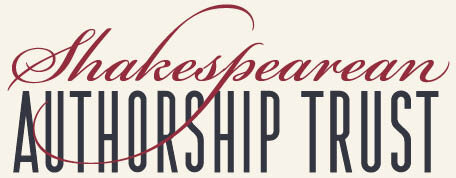Edward de Vere,
17th Earl of Oxford
Dates:
1550 – 1604
Background:
Aristocratic, educated first privately, then at Cambridge and Gray's Inn. Two of his uncles, Lords Sheffield and Surrey, were influential poets; a third, Arthur Golding, was responsible for the translation of Ovid's Metamorphoses that was “Shakespeare’s favourite book.” A prominent courtier, he toured the Continent in 1575-76, principally France and Italy, and is said to have had a house in Venice. In 1586 until his death in 1604 Oxford received a grant of £1000 a year from the Crown. His final years were spent in relative seclusion at King's Place in Hackney.
Famous For:
De Vere was known as a poet and playwright of excellence, as well as a patron of authors and acting companies. He was a champion jouster and sometime favourite of the Queen, but fell from grace. He married Lord Burghley’s daughter Anne Cecil, and was ridiculed as a cuckold. His second daughter by her, Susan, was said to have been born by means of a “bed trick”, whereby Oxford was brought to sleep with his wife thinking she was his mistress. In 1579 his celebrated quarrel with Sir Philip Sidney over a game of tennis was very nearly the subject of a duel, while in 1581 his affair with Anne Vavasour, one of the Queen's maids of honour by whom he had a son, created a scandal at court. King James referred to him as “Great Oxford.”
The Case:
De Vere possessed the classical learning and knowledge of the law, music, Italian culture and aristocratic sports that feature so prominently in the Shakespeare canon. The poetry that has survived under his own name, as well as his letters, both corroborate the case for his authorship. The Shakespeare plays are replete with references to his career at Court and subsequent fall from grace, in particular his relationship with Queen Elizabeth and her chief minister Lord Burghley, who is believed to have been satirised as Polonius in Hamlet. Under his authorship the plays become political satires of Court life and powerful critiques of the government, hence his anonymity. Shortly before his death in 1604, the flow of new Shakespearean publications ceased. In 1623 his family financed the First Folio of Shakespeare's works, one of the dedicatees being Oxford's son-in-law Philip Herbert, Earl of Montgomery. Oxford was lost to public consciousness for more than three hundred years, until the publication of Shakespeare Identified in 1920.
Links for further information
The De Vere Society is an offshoot of the SAT and is based in Britain; it usually meets twice a year. The Society publishes a quarterly newsletter and various books on the case for Oxford.
The Shakespeare Oxford Fellowship is also an offshoot of the SAT, but is based in North America. It usually holds a four-day conference annually, and publishes a quarterly newsletter and various books on the case for Oxford.
The Oxford Shakespeare site has a very large number of contemporary documents transcribed with detailed analysis.
Two blogs by associates of the SAT in particular will arouse interest (and you will find many more with an online search):
Stephanie Hughes at www.politicworm.com
Hank Whittemore at www.HankWhittemore.com
Alexander Waugh’s YouTube channel explores many new and challenging theories.
Books for further information
The Shakespeare Authorship Question and Philosophy: Knowledge, Rhetoric, Identity, by Michael Dudley, 2023
Shakespeare by Another Name, by Mark Anderson, 2005
De Vere as Shakespeare: As Oxfordian Reading of the Canon, by William Farina, McFarland, 2006, 2014
Great Oxford: Essays on the Life and Work of Edward de Vere, by Richard Malim, 2004
The Mysterious William Shakespeare: The Myth and the Reality, by Charlton Ogburn, 1984, 1997
This Star of England, by Dorothy and Charlton Ogburn, 1972
Shakespeare Revealed in Oxford’s Letters, by William Plumer Fowler, 1986
Alias Shakespeare: Solving the Greatest Literary Mystery of All Time, by Joseph Sobran, 1997
Shakespeare Identified, by J. Thomas Looney, 1920
Shakespeare, Who Was He?, by Richard Whalen, 1994
The Monument: Shake-Speares Sonnets by Edward de Vere, by Hank Whittemore and Alex McNeil, 2005
Oxford: Son of Queen Elizabeth I, by
Paul Streitz, 2001
Shakespeare’s Lost Kingdom: The True History of Shakespeare and Elizabeth, by Charles Beauclerk, 2010

